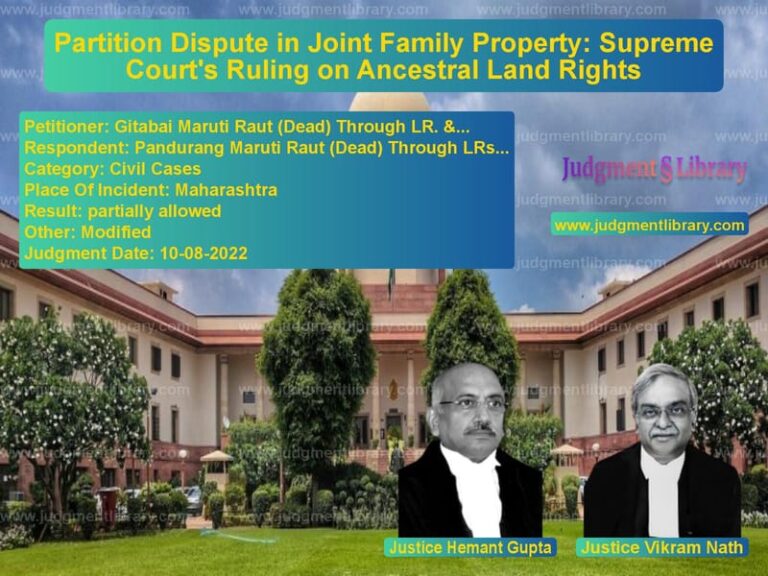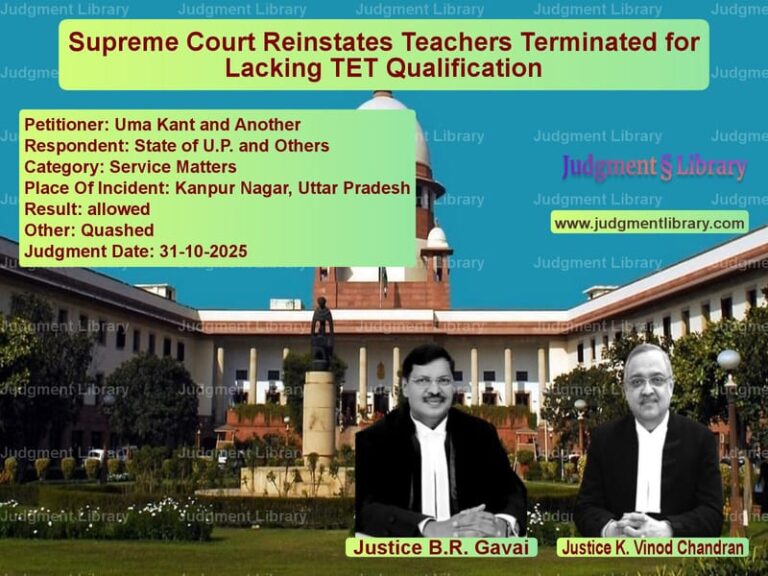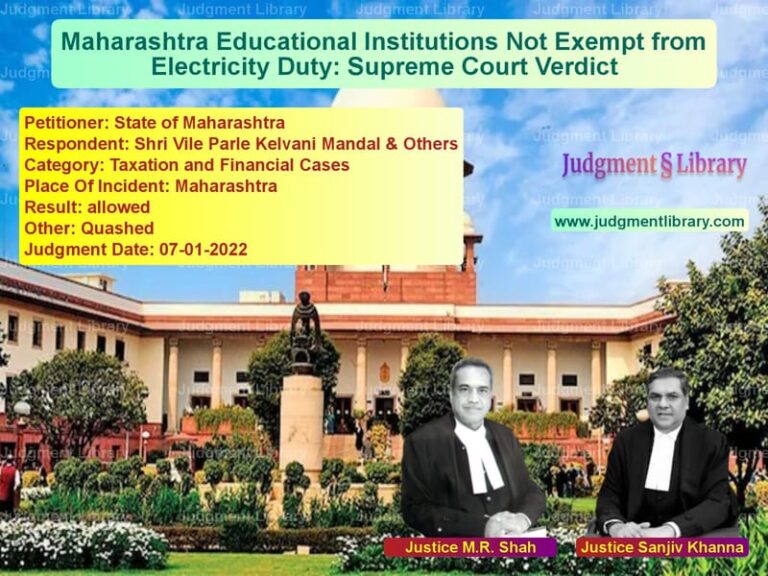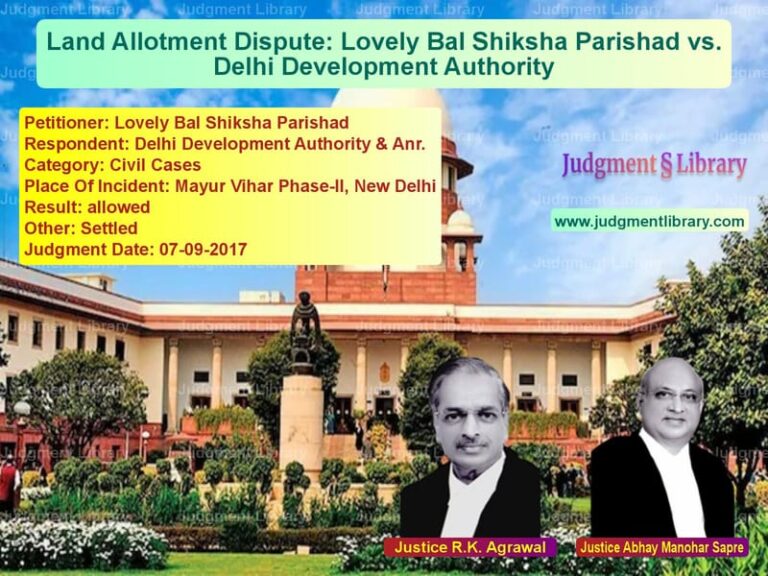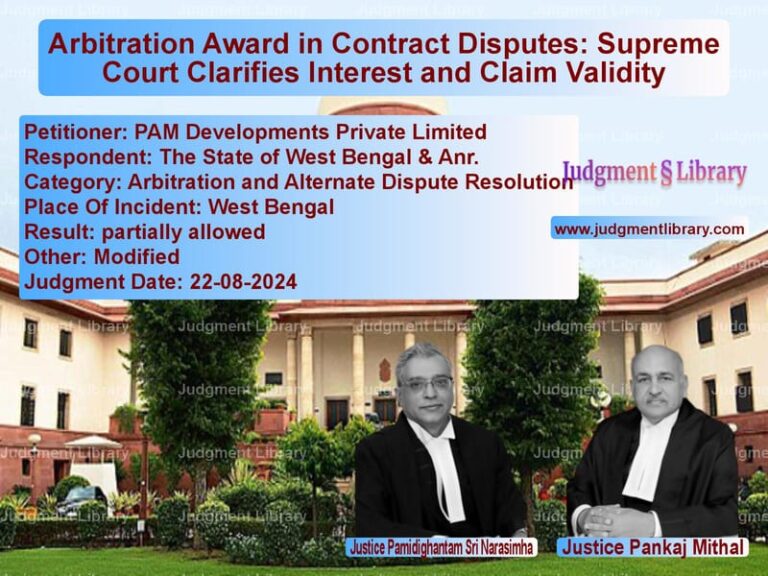Supreme Court Rules on ESIC Applicability to Municipal Factories: Key Implications
The case of Employees’ State Insurance Corporation v. Kakinada Municipality & Others revolved around the applicability of the Employees’ State Insurance (ESI) Act, 1948, to a factory run by a municipality. The Supreme Court was required to determine whether the employees of M/s. Victoria Water Works, a factory controlled by Kakinada Municipality, were subject to ESI contributions despite the municipality providing superior benefits.
Background of the Case
The dispute arose after the ESI Corporation issued notices demanding contributions from Kakinada Municipality for employees working in the Victoria Water Works factory. The ESI Act, under Section 1(4), applies to all factories, including those belonging to the government, unless they meet specific exemption criteria.
The respondent-municipality challenged the applicability of the ESI Act, arguing that the factory employees were already receiving superior benefits. They approached the ESI Court, which rejected their application. However, the Andhra Pradesh High Court overturned the ESI Court’s ruling, leading to an appeal before the Supreme Court.
Key Issues Before the Supreme Court
- Whether the Victoria Water Works factory, run by the municipality, was subject to the ESI Act.
- Whether the factory was exempt under the proviso to Section 1(4) of the Act.
- Whether the ESI Court had jurisdiction to grant exemptions under Section 90 of the Act.
- Whether the Andhra Pradesh High Court erred in its judgment.
Arguments by the Appellant (ESI Corporation)
The ESI Corporation contended that:
- The Victoria Water Works factory fell under the definition of a factory under Section 1(4) of the ESI Act, and contributions were mandatory.
- The proviso to Section 1(4) applied only to factories owned or controlled by the government, which did not include municipal-run entities.
- Under Section 90, the power to grant exemptions lay with the appropriate government after consultation with the Corporation, not with the ESI Court.
- The High Court erred by treating the municipality’s claim as valid without proper examination of its exemption status.
Arguments by the Respondents (Kakinada Municipality)
The respondent-municipality argued that:
- It was a local self-government entity and provided superior benefits to its employees, making ESI coverage redundant.
- The factory should be exempt under the proviso to Section 1(4) as it was controlled by a statutory body.
- The ESI Court should have recognized the superior benefits provided to employees and exempted the factory.
- The High Court rightly ruled in its favor based on previous precedents.
Supreme Court’s Analysis
The Supreme Court, comprising Justices K.M. Joseph and Pamidighantam Sri Narasimha, examined the statutory provisions and previous judicial interpretations.
Key Findings
- Municipal Factories Are Not Automatically Exempt: The Court held that the proviso to Section 1(4) applied only to government-owned or government-controlled factories, not those run by municipalities.
- Exemptions Require Government Approval: The Supreme Court clarified that exemption under Section 90 must be granted by the appropriate government after consultation with the ESI Corporation.
- High Court’s Ruling Was Incorrect: The Court found that the Andhra Pradesh High Court erroneously extended the exemption without following statutory requirements.
- Jurisdiction of ESI Court Limited: The ESI Court lacked the authority to grant exemptions, which could only be done by the government under Section 90.
Key Observations by the Supreme Court
“The power of exemption is indeed only with the appropriate Government. If a factory or establishment is covered under the Act, then the only way to take it out of the purview of the Act is by an act of exemption through the government.”
“The ESI Court did not have any jurisdiction to decide the matter in the manner in which the High Court has finally decided the matter.”
Final Judgment
The Supreme Court ruled:
- The Andhra Pradesh High Court’s judgment was set aside.
- The decision of the ESI Court rejecting the municipality’s exemption claim was restored.
- The municipality was directed to comply with ESI contributions unless a valid exemption was granted by the appropriate government.
- The municipality was free to apply for an exemption under Section 90, but until granted, contributions remained mandatory.
Implications of the Judgment
This ruling has significant implications:
- Reinforces ESI Applicability: The judgment affirms that municipal factories must comply with ESI provisions unless formally exempted.
- Clarifies the Role of Exemptions: It sets a clear precedent that only the appropriate government, after due consultation, can grant exemptions.
- Restricts Judicial Overreach: The ruling limits the High Court’s ability to interfere in exemption matters without statutory backing.
Conclusion
The Supreme Court’s decision in Employees’ State Insurance Corporation v. Kakinada Municipality reinforces the legal framework governing ESI contributions for municipal factories. By overturning the High Court’s decision, the judgment ensures that exemptions are granted through proper channels and that compliance with labor welfare laws remains robust.
Petitioner Name: Employees’ State Insurance Corporation.Respondent Name: Kakinada Municipality & Others.Judgment By: Justice K.M. Joseph, Justice Pamidighantam Sri Narasimha.Place Of Incident: Kakinada, Andhra Pradesh.Judgment Date: 28-09-2021.
Don’t miss out on the full details! Download the complete judgment in PDF format below and gain valuable insights instantly!
Download Judgment: employees’-state-ins-vs-kakinada-municipalit-supreme-court-of-india-judgment-dated-28-09-2021.pdf
Directly Download Judgment: Directly download this Judgment
See all petitions in Public Sector Employees
See all petitions in Employment Disputes
See all petitions in Judgment by K.M. Joseph
See all petitions in Judgment by P.S. Narasimha
See all petitions in allowed
See all petitions in Set Aside
See all petitions in supreme court of India judgments September 2021
See all petitions in 2021 judgments
See all posts in Service Matters Category
See all allowed petitions in Service Matters Category
See all Dismissed petitions in Service Matters Category
See all partially allowed petitions in Service Matters Category


